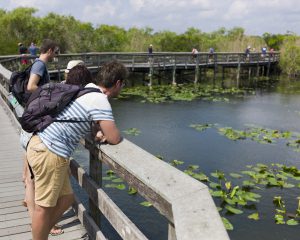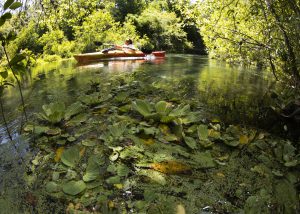
The University of Florida has launched an assessment survey to identify which natural resource, wildlife and agricultural interests and needs for information are most pressing to the Spanish-speaking communities across the Sunshine State.
This survey is part of a multistate partnership Extension research initiative in collaboration with New Mexico State University and the University of Arizona and funded by a $100,000 USDA National Institute of Food and Agriculture grant. The survey, available in English and Spanish, is intended only for Hispanic adults living in the three collaborating states and takes 15 minutes to complete. Follow this link to take the survey.
Based on the results of the survey, the universities’ next steps are twofold:
- To provide translated Extension publications to improve these communities’ accessibility to information on natural resource extension, wildlife and agriculture they seek.
- To improve the efficacy of the Cooperative Extension System for Hispanics.
“The overarching objective is to develop a national framework to provide extension resources to Hispanic communities. This framework will guide the state level Extension programs,” said Hance Ellington, a principal investigator of the project and UF/IFAS

assistant professor and grazing lands wildlife specialist at UF/IFAS Range Cattle Research and Education Center in Ona. “The framework will expand the capacity, reach, and impact of the Cooperative Extension System by expanding the availability of extension resources to Hispanic communities.”
Hispanics represent 19.1% of the U.S. population, according to the 2022 U.S. Census Bureau. Spanish is the first language for many Hispanics, with more than 70% of this population speaking this language at home, according to a national survey by the Pew Research Center in 2017.
“Research has shown that although there are multiple barriers to successful extension within Hispanic communities, perhaps one of the biggest barriers is language,” said Ellington.
Hispanic community members often want their information (extension or otherwise) to be provided in Spanish, and even bilingual Hispanics recognize and appreciate efforts to provide information in Spanish. It can help build trust and respect, he further explained.
A final component of the framework will be to develop a website, proposed as NUEVO (Natural Resources Extension Via Outreach). This public website will be a national hub for Extension resources in Spanish, such as translated documents, blog posts, and videos. Initially, this hub will hold all existing natural resource Extension publications currently available in Spanish, and over time it will hold all translated and newly developed content as it is produced.
“I hope our program galvanizes action nationwide to greatly increase efforts to translate existing material but also create new material and programming where it is needed most by the Hispanic communities in Florida,” he said.
For more information about the survey or program, email Ellington at e.ellington@ufl.edu.
###
By Lourdes Mederos, rodriguezl@ufl.edu
Para accesar a esta comunicación en español, por favor utilice este enlace.
ABOUT UF/IFAS
The mission of the University of Florida Institute of Food and Agricultural Sciences (UF/IFAS) is to develop knowledge relevant to agricultural, human and natural resources and to make that knowledge available to sustain and enhance the quality of human life. With more than a dozen research facilities, 67 county Extension offices, and award-winning students and faculty in the UF College of Agricultural and Life Sciences, UF/IFAS brings science-based solutions to the state’s agricultural and natural resources industries, and all Florida residents.
 2
2
